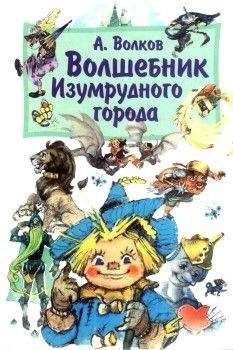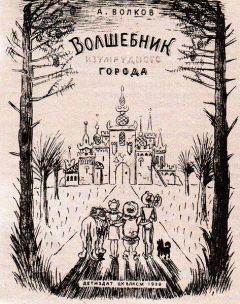Илья Франк - Английский язык с Ф. Баумом. Волшебник Изумрудного Города

Обзор книги Илья Франк - Английский язык с Ф. Баумом. Волшебник Изумрудного Города
Английский язык с Ф. Баумом
Волшебник Изумрудного Города
L. Frank Baum
The Wonderful Wizard of Oz
Пособие подготовила Ольга Ламонова
Метод чтения Ильи Франка
1. The Cyclone (Ураган; cyclone — циклон)
Dorothy lived in the midst of the great Kansas prairies (Дороти жила посреди огромных прерий Канзаса), with Uncle Henry, who was a farmer (с Дядюшкой Генри, который был фермером), and Aunt Em, who was the farmer's wife (и тетушкой Эм, /которая была/ женой фермера). Their house was small (их дом был маленьким), for the lumber to build it had to be carried by wagon many miles (так как древесину для его строительства: «чтобы его построить» нужно было привозить на повозке за много миль; lumber — пиломатериалы). There were four walls (/у него/ было четыре стены), a floor and a roof (пол и крыша), which made one room (которые образовывали одну комнату, to make — делать, конструировать, создавать); and this room contained a rusty looking cookstove (и в этой комнате находились: ржавая на вид кухонная плита; to contain — содержать в себе, иметь /в своем составе/; to look — смотреть, глядеть; выглядеть, иметь вид), a cupboard for the dishes (буфет для посуды; dish — тарелка, миска; посуда), a table (стол), three or four chairs (три или четыре стула), and the beds (и кровати).
Dorothy ['dOrqTI], Kansas ['kxnzqs], prairie ['pre(q)rI], uncle [ANkl], aunt [Q:nt], lumber ['lAmbq], cookstove ['kukstquv]
Dorothy lived in the midst of the great Kansas prairies, with Uncle Henry, who was a farmer, and Aunt Em, who was the farmer's wife. Their house was small, for the lumber to build it had to be carried by wagon many miles. There were four walls, a floor and a roof, which made one room; and this room contained a rusty looking cookstove, a cupboard for the dishes, a table, three or four chairs, and the beds.
Uncle Henry and Aunt Em had a big bed in one corner (у Дядюшки Генри и Тетушки Эм была большая кровать в одном углу /комнаты/), and Dorothy a little bed in another corner (а у Дороти /была/ маленькая кровать в другом углу /комнаты/). There was no garret at all (чердака не было вовсе; at all — совсем, полностью), and no cellar except a small hole dug in the ground (не было и подвала, за исключением небольшой ямы, выкопанной в земле; hole — дыра, отверстие; яма, воронка; to dig — копать, рыть), called a cyclone cellar (называемой = которую называли ураганным подвалом), where the family could go (куда семья могла бы пойти = спуститься) in case one of those great whirlwinds arose (в случае, /если бы/ поднялся один из тех сильных ураганов; to arise — возникать, появляться; great — большой, огромный; сильный, интенсивный) mighty enough to crush any building in its path (мощных настолько, чтобы разрушить любое здание на своем пути; to crush — давить, жать; сокрушить, уничтожить). It was reached by a trap door in the middle of the floor (до него = до подвала добирались через люк в полу, /расположенный/ посередине /комнаты/; to reach — протягивать, вытягивать; достигать, добираться; trap-door — люк, опускная дверь), from which a ladder led down into the small, dark hole (от которого лестница вела вниз, в маленькую темную яму; to lead).
garret ['gxrIt], cellar ['selq], cyclone ['saIklqun], whirlwind ['wq:lwInd]
Uncle Henry and Aunt Em had a big bed in one corner, and Dorothy a little bed in another corner. There was no garret at all, and no cellar — except a small hole dug in the ground, called a cyclone cellar, where the family could go in case one of those great whirlwinds arose, mighty enough to crush any building in its path. It was reached by a trap door in the middle of the floor, from which a ladder led down into the small, dark hole.
When Dorothy stood in the doorway and looked around (когда Дороти стояла в дверях и смотрела вокруг; doorway — дверной проем), she could see nothing but the great gray prairie on every side (она не могла увидеть ничего = она не видела ничего, кроме огромной = бескрайней серой прерии со всех сторон: «с каждой стороны»). Not a tree nor a house broke the broad sweep of flat country (ни дерево, ни дом не нарушали широких просторов равнинной местности; to break — ломать; прерывать, нарушать; sweep — выметание, подметание; пространство, охватываемое взглядом, простор; flat — плоский; нерельефный, плоский; country — страна; местность) that reached to the edge of the sky in all directions (которая доходила до края неба во всех направлениях; edge — острие, лезвие; край, кромка). The sun had baked the plowed land into a gray mass (солнце обожгло вспаханную землю, /превратив ее/ в серую массу; to bake — печь, выпекать; припекать, сушить), with little cracks running through it (с маленькими трещинками, бегущими по ней; to run — бежать, бегать; тянуться, простираться).
doorway ['dO:weI], sweep [swi:p], plow [plau], mass [mxs]
When Dorothy stood in the doorway and looked around, she could see nothing but the great gray prairie on every side. Not a tree nor a house broke the broad sweep of flat country that reached to the edge of the sky in all directions. The sun had baked the plowed land into a gray mass, with little cracks running through it.
Even the grass was not green (даже трава не была зеленой), for the sun had burned the tops of the long blades (так как солнце выжгло длинные былинки: «верхнюю поверхность длинных травинок»; top — верхушка, вершина /мачты, горы и т. д./; верхняя поверхность; blade — лезвие; длинный узкий лист) until they were the same gray color to be seen everywhere (пока они не стали того же серого цвета, который был виден повсюду). Once the house had been painted (когда-то дом был покрашен; once — один раз; когда-то, некогда), but the sun blistered the paint (но солнце облупило краску; blister — волдырь, водяной пузырь; to blister — вызывать пузыри) and the rains washed it away (и дожди смыли ее; to wash — мыть, обмывать; to wash away — смывать, вымывать), and now the house was as dull and gray as everything else (и теперь дом был таким же тусклым и серым, как и все остальное; dull — тупой, глупый; тусклый, серый).
grass [grQ:s], green [gri:n], burn [bq:n], blister ['blIstq]
Even the grass was not green, for the sun had burned the tops of the long blades until they were the same gray color to be seen everywhere. Once the house had been painted, but the sun blistered the paint and the rains washed it away, and now the house was as dull and gray as everything else.
When Aunt Em came there to live she was a young, pretty wife (когда Тетушка Эм приехала сюда жить, она была молодой прелестной женой).
The sun and wind had changed her, too (солнце и ветер изменили и ее тоже). They had taken the sparkle from her eyes (они забрали блеск из ее глаз = они лишили ее глаза блеска; sparkle — искорка; блеск, сверкание) and left them a sober gray (и оставили их неяркого серого /цвета/; to leave — уходить, уезжать; оставлять в каком-либо положении или состоянии; sober — трезвый; неяркий, спокойный /о цвете/); they had taken the red from her cheeks and lips (они забрали румянец ее щек и красноту ее губ; red — красный цвет, краснота), and they were gray also (и они также были серыми). She was thin and gaunt (она была худая и костлявая), and never smiled now (и теперь никогда не улыбалась). When Dorothy, who was an orphan, first came to her (когда Дороти, которая была сиротой, впервые приехала к ней), Aunt Em had been so startled by the child's laughter (Тетушка Эм была настолько напугана смехом девочки: «ребенка») that she would scream and press her hand upon her heart (что вскрикивала и прижимала /свою/ руку к /своему/ сердцу /каждый раз/; scream — вопль, пронзительный крик; to scream — пронзительно кричать, вопить) whenever Dorothy's merry voice reached her ears (когда веселый голосок Дороти долетал до ее ушей; to reach — протягивать, вытягивать; доходить, достигать слуха); and she still looked at the little girl with wonder (и она все еще глядела на маленькую девочку с удивлением) that she could find anything to laugh at (что та могла найти над чем посмеяться: «найти что-то, /чтобы/ посмеяться над /этим/»).
young [jAN], sober ['squbq], gaunt [gO:nt], laughter ['lQ:ftq]
When Aunt Em came there to live she was a young, pretty wife.
The sun and wind had changed her, too. They had taken the sparkle from her eyes and left them a sober gray; they had taken the red from her cheeks and lips, and they were gray also. She was thin and gaunt, and never smiled now. When Dorothy, who was an orphan, first came to her, Aunt Em had been so startled by the child's laughter that she would scream and press her hand upon her heart whenever Dorothy's merry voice reached her ears; and she still looked at the little girl with wonder that she could find anything to laugh at.
Uncle Henry never laughed (дядюшка Генри никогда не смеялся). He worked hard from morning till night (он много работал с утра до ночи; hard — сильно, интенсивно; настойчиво, упорно; to work hard — много работать) and did not know what joy was (и не знал, что такое радость). He was gray also (он тоже был серым), from his long beard to his rough boots (от длинной бороды до грубых ботинок), and he looked stern and solemn (и выглядел он суровым и серьезным), and rarely spoke (и говорил редко).
It was Toto that made Dorothy laugh (именно Тото заставлял Дороти смеяться; to make smb. do smth. — заставлять, побуждать кого-либо делать что-либо), and saved her from growing as gray as her other surroundings (и уберег ее от того, чтобы она стала такой же серой, как все ее окружение; to save — спасать; уберегать; to grow — произрастать, расти; делаться, становиться; surroundings — окрестности; среда, окружение). Toto was not gray (Тото не был серым; ср.: gray — серый; мрачный, безрадостный); he was a little black dog (он был небольшим черным псом = это был маленький черный песик), with long silky hair and small black eyes (с длинной шелковистой шерстью и маленькими черными глазками; hair — волосы; шерсть /собаки, кошки и т. п./) that twinkled merrily on either side of his funny, wee nose (которые весело поблескивали с каждой стороны = по сторонам его забавного крошечного носа; twinkle — мигание; огонек, блеск в глазах; to twinkle — блестеть, сверкать). Toto played all day long (Тото играл весь день напролет), and Dorothy played with him (и Дороти играла вместе с ним), and loved him dearly (и нежно его любила).
joy [dZOI], beard [bIqd], rough [rAf], solemn ['sOlqm], surrounding [sq'raundIN]
Uncle Henry never laughed. He worked hard from morning till night and did not know what joy was. He was gray also, from his long beard to his rough boots, and he looked stern and solemn, and rarely spoke.
It was Toto that made Dorothy laugh, and saved her from growing as gray as her other surroundings. Toto was not gray; he was a little black dog, with long silky hair and small black eyes that twinkled merrily on either side of his funny, wee nose. Toto played all day long, and Dorothy played with him, and loved him dearly.

